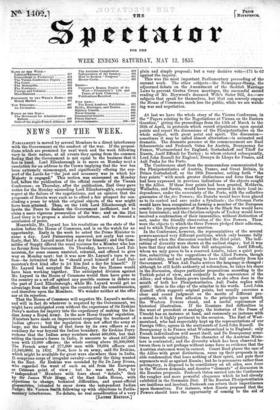NEWS OF THE WEEK.
PARLIAMENT is moved by several Members to a direct interference with the Government on the conduct of the war. If the proposi-
tions which are promised for next week and the week following vary in their nature, at all events they spring from the common
feeling that the Government is not equal to the business that it has in hand. Lord Ellenborough is to move on Monday next a 'resolution for an address to the Crown implying that the war has been extremely mismanaged, and significantly offering the sup- port of the Lords for "the just and necessary war in which her Majesty is engaged." This motion was announced on Monday last, before the publication of the official records of the Vienna Conference ; on Thursday, after the publication, Earl Grey gave notice for the Monday succeeding Lord Ellenborough's, expressing regret at the failure of the negotiations, and an opinion that the proposals of Russia were such as to afford a fair prospect for con- cluding a peace by which the original objects of the war might have been attained. Thus, on the 14th Lord Ellenborongh will invite the Peers to declare the Government inefficient, and to claim a more vigorous prosecution of the war; and on the 21st Lord Grey is to propose a similar interference, and to demand a conclusion of peace. Meanwhile, Mr. Layard has his resolutions on the state of the nation before the House of Commons, and is on the watch for an opportunity. Early in the week he asked the Prime Minister to name a day. Lord Palmerston answered, not coyly but cava- lierly, that Mr. Layard must find a day for himself; and the Com- mittee of Supply offered the usual resource for a Member who has no favour from Government. On Thursday, however, Lord Pal- merston, for some reason unstated, relented, and offered to give way on Monday next: but it was now Mr. Layard's turn to re- fuse--he intimated that he " should avail himself of Lord Pal- merston's first kind offer to let him find a day for himself." If Mr. Layard had accepted the Monday, the two Houses would have been working together. The anticipated division against Mr. Layard in the House of Commons would then have gone to the country as a set-off against any possible success in debate on the part of Lord Ellenborough; while Mr. Layard would get no advantage from the effect upon the country and the constituencies, and therefore upon the Members. We wonder neither at the offer nor at its rejection. That the House of Commons will negative Mr. Layard's motion, and will in fact do whatever is required by the Government, we might have anticipated even without the experience of Sir Erskine Perry's motion for inquiry into the expediency of making the In- dian Army a Royal Army. In the new Horse Guards' regulation, Ministers have made an improvement respecting the treatment of Indian officers ; but the regulation does not affect the army at large, nor the handling of that force by its own officers as an auxiliary for war beyond the Indian boundary. Sir Erskine Perry reckons that the Indian army numbers about 400,000, but that adding the Queen's foroes in India, it amounts to about 457,000 men with 12,000 officers; the whole costing above 20,500,000/. The French army of 377,000 men with 19,604 officers cost 12,340,0001. in 1852. Now, here is an army, said Sir Erskine, which might be available for great wars elsewhere than in India. It comprises corps of irregular cavalry—exactly the thing wanted in the East. Sir Erskine was seconded by Sir De Laoy Evans, who regarded the want of such an aid from the European or Crimean point of viewbut he was met, first, by 44 independent " Members with fears about " details," then by Sir James Weir Hogg, of the East India House, with objections to change, technical difficulties, and quasi-official pleasantries, intended to sneer down the independent Indian Judge; Mr. -Vernon Smith following up with objections to Parlia- mentary interference. No debate, no real consideration of a very
plain and simple proposal; but a very decisive vote-171 to 62 against the inquiry. This was the most important Parliamentary proceeding of the current week. The other subjects—the Newspaper-Stamp, the adjourned debate on the Amendment of the Scottish Marriage Laws to prevent Gretna Green marriages, the successful second reading of Mr. Heywood's deceased Wife's Sister Bill, &o.—are subjects that speak for themselves, but that can scarcely engage the House of Commons, much less the public, while we are watch- ing war and negotiation.


























